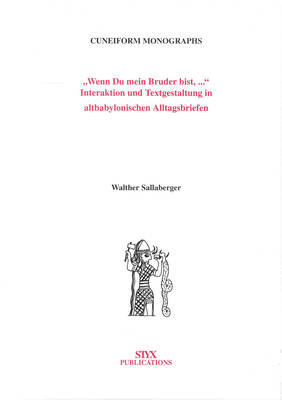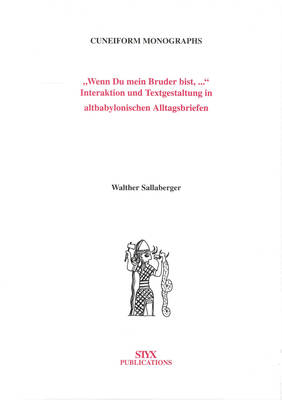
- Afhalen na 1 uur in een winkel met voorraad
- Gratis thuislevering in België vanaf € 30
- Ruim aanbod met 7 miljoen producten
- Afhalen na 1 uur in een winkel met voorraad
- Gratis thuislevering in België vanaf € 30
- Ruim aanbod met 7 miljoen producten
Zoeken
Wenn Du Mein Bruder Bist, ...
Interaktion Und Textgestaltung in Atlbabylonischen Alltagsbriefen
Sallaberger
€ 290,45
+ 580 punten
Omschrijving
Among cuneiform texts, only letters address directly a concrete historical person. Letters being texts composed and used in everyday verbal interaction, they replace direct communication. This specific situational context provokes basic questions such as: from the point of view of the ancient letter writer, what are the conventionally possible ways of expressing the intentions of the sender? And from the modern researcher's standpoint, how can we detect the 'tone' of a given letter? This study focuses neither on the facts represented and the persons communicating nor on the system of the language, but is rather concerned with the specific, rule-governed use of language in interaction. The method employed is a combination of the philological treatment of the texts with questions and insights from linguistic pragmatics, discourse analysis, and text linguistics. The book concentrates on the corpus of Old Babylonian letters from Mesopotamia. The topics treated include: address behaviour, i.e. use and interdependence of term of address, greeting, and form of address of the verb; the stucture and the basic function of an Old Babylonian letter; the polite speech acts of gratitude and of asking a favour; rational argumentation in everyday verbal interaction.
Specificaties
Betrokkenen
- Auteur(s):
- Uitgeverij:
Inhoud
- Aantal bladzijden:
- 302
- Taal:
- Duits
- Reeks:
- Reeksnummer:
- nr. 16
Eigenschappen
- Productcode (EAN):
- 9789056930295
- Verschijningsdatum:
- 1/01/1999
- Uitvoering:
- Hardcover
- Formaat:
- Genaaid
- Afmetingen:
- 180 mm x 245 mm
- Gewicht:
- 793 g

Alleen bij Standaard Boekhandel
+ 580 punten op je klantenkaart van Standaard Boekhandel
Beoordelingen
We publiceren alleen reviews die voldoen aan de voorwaarden voor reviews. Bekijk onze voorwaarden voor reviews.








